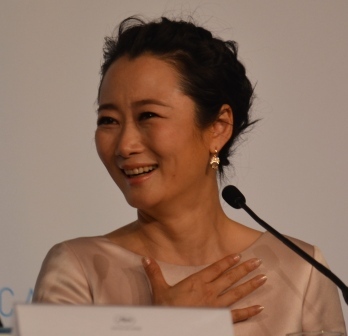Jia Zhangke's Mountains May Depart, a three-act movie beginning in 1999 and ending in 2025, seems very light in the first act. The film opens with a peppy shot of young people dancing in a circle to exuberant music and then we are led to the story of two young men vying for the attention of a beautiful girl. The girl, fresh and lively, loves to "sing the New Year's song." The two suitors are close friends: one is a miner, the other a newly rich industrialist. The rivalry is comic, with one boy throwing dynamite into a frozen lake (a traditional symbol, I learned, of springtime romance), and the other boy buying dynamite to kill him, while the girl is sparklingly young and flirtatious with both. The girl "Tao", played by the director's wife Zhao Tao, happily welcomes both suitors, declaring that "triangles are best because they are more stable." Nevertheless, Tao's choice becomes clear very soon. It's not too much of a plot spoiler to say she chooses the man with the fancy car. The metaphor is clear: the new business class of China will take over the future (and the girl), a choice of destiny that the movie heralds as heedless.
So far the story seems an allegorical romance, almost moralistic, but in the second act, which takes place fourteen years later, the movie changes tone, redeeming it from the stilted charm of the first. Suddenly the same characters are older, with life having sent some punches: i.e. sickness, estrangement and divorce. "Do you still sing the New Year's song?" Tao's former defeated beau asks her. "No," she says. The choice she made was not the right one. One consequence is estrangement from her child, a son her moneyed husband named "Dollar."
The third act (which is my favorite) heightens the negative judgement on the rising nouveau riche class and, with creative flair, gells the film splendidly. In this section (surprisingly in English), Dollar, now a university student, is the central character. The young man, raised in prep schools with every advantage, except the one of having a mother, now lives in Australia with his upper class Dad, who has renamed himself "Peter". We first see Dollar learning Chinese in a class with other immigrant Chinese youngsters, a language all have forgotten. The pretty teacher also tries to teach them Chinese traditional songs, since apparently the new generation knows them not. Australia, as a background, offers vistas of wide ocean beaches, which rather than inspire, seem cold and unwelcoming.
It is a movie that seems to decry the loss of Chinese traditions, industrialization (many scenes show bulldozers and construction), and the rise of consumerism. What results from the all-powerful love of money, in this film, is broken marriages, alienated youth and rootlessness. The warm-hearted Chinese teacher--the most parental and wise character in the film---tries her best to help Dollar heal his broken family, urging him to make amends with his father and his mother, or at the very least learn a little Chinese. The most hilarious scene in the film is when she acts as a translator for the boy and his Westernized dad, the three seated in couches before a plate glass view of the sea, while the angry boy threatens to quit school and the rich Dad plays with his gun collection.
I met with Jia to discuss--curious how openly the director could speak about his political allegory, given the censorship controls of the Chinese government. His last film, the award-winning Touch of Sin (2013), also critical of China, has yet to screen in his native country, with an unofficial ban on its release.

How is this film a critique of the over-valorisation of money in contemporary Chinese society?
In today's world, not only China, there is too much thinking about money. I wanted to focus on the singular mindset of consumerism, how people make decisions about their love lives based on consumerism, My film is an attempt to urge spectators to think about other [values] than consumerism. If we continue as a society based on money, with decisions based on financial reasons, we will incur dire consequences, like what we see in the third section of the film.
Can you comment on the positive and negative changes the economic boom has spurred in China?
Globalization and the economic boom are bringing more resources to people. Living standards are better in China, but the economic change is also very damaging. Today, from a very young age, society obliges us to enter into competition. Traditions are changing: if you go to Shanghai, you will see a very different China than in the rural areas. I think the role of a film director is to show these different alternatives.
Why so many references to exile in this film? Tao moves from her home town, and learns too late of her father's death. Her ex-husband and son move to Australia. The teacher migrates first to Canada, then to Australia....
My film is about human emotions and love and how these evolve in time. In order to treat this theme, I must look at how environment and economy change the way people relate to each other. Today many Chinese have migrated, from town to town, or overseas. Before, in traditional Chinese society, we had a close-knit family structure. People weren't very mobile. The family structure included the younger generation, the elderly. Children wouldn't move so as to be able to spend time with their parents in their last stages of life.
This has completely changed in contemporary China because of the economy. Today we have floating populations who migrate to better themselves financially. I am interested in how these patterns of migration affect human relations and love. In small towns in China, we all begin by living in the same place, but then destiny separates us. As for the character of the teacher: she is from Hong Kong, migrates first to Canada, and then to Australia. She is looking for her place; she needs affection...
Did you deliberately write an allegory about changing China?
When I wrote the script I did not think in terms of metaphors or allegorical symbols. It is a story about emotions, love and human connections. But of course these characters are influenced by their environment.
Why is the film in three acts?
I wanted to use the length of the film to show how the fever of youth becomes bitter. The song that begins the film--the Pet Shop Boys' Go West--was one of my own favorite songs in the 1990s. I would get together with other young people and go to discos, where we would dance collectively, like the circle dance you see in the first shot. The film finishes in 2025, because it is after time has passed that we reflect on what we have done with our life and the choices we have made.
I am now fifty years old, and have acquired many experiences in my life, as far as emotions are concerned.
Your award-winning film "A Touch of Sin" (2013) has not yet received approval for release in China. What do you think of this censorship, and what hope do you have for your new film to be shown in China?
A Touch of Sin has not been released in China, even though it received governmental approval two years ago. I will not give up. I will push and make it happen. Similarly this new film was approved before I brought it here to Cannes, but you never know what is going to happen, as we learned from previous complications, and until the moment that it is actually shown, fingers crossed.

